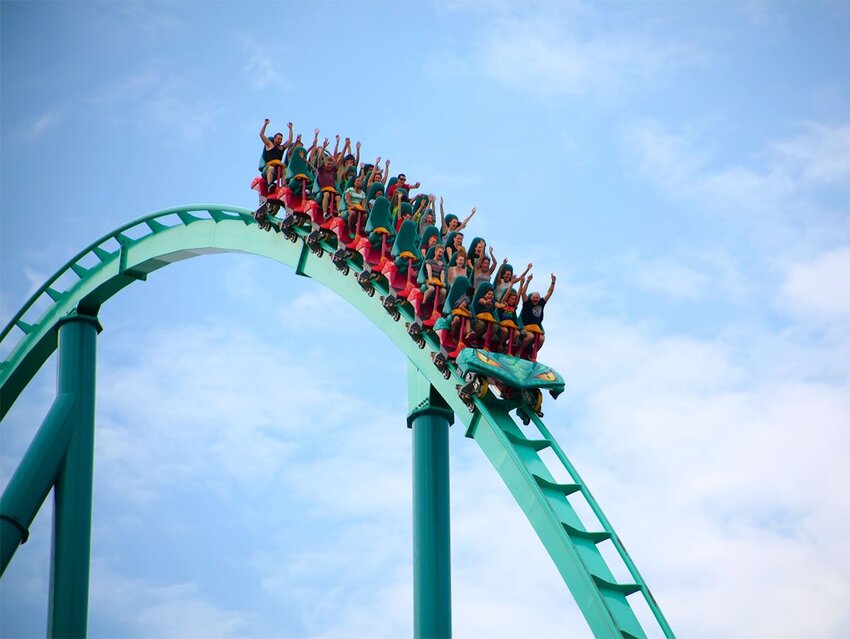We pay big bucks for thrills at amusement parks and movie theaters — that feeling of anticipation and excitement when you’re approaching the peak of a massive roller coaster, or waiting for something alarming to pop out from the dark while watching a scary movie. “Thrill” began its journey as a verb related to swordplay, but as the word acquired a more figurative sense, the nouns “thrill” and “thriller” helped describe the emotional experiences. On the opposite end of the spectrum, “chill” was originally synonymous with literal cold, but later came to describe being relaxed, calm, or laid-back. In current parlance, it has also acquired a risqué double entendre meaning. Let’s explore how these words have evolved over the centuries, especially in their modern usage.
Piercing the Enemy (Or Lover)
The word “thrill” originated in the 1300s when, in Old English, it was þyrlian, meaning to “perforate or pierce.” This original definition of “thrill” applied to battles, as in “thrilling” the enemy with a sword. The word started to take on a more metaphorical meaning by the 17th century, when one could be pierced by much more than a literal sword. Love could be thrilling, for example, as seen in the many metaphors about being pierced by Cupid’s arrow.
“Thriller” as a Genre and a Noun
In the early 1900s, certain types of books began to be called “thrillers” — the shared characteristics of this genre were suspense and close encounters with danger, and there were usually run-ins with crime and suspicious characters. Later, movies were called “thrillers,” too. Alfred Hitchcock was one of the first to clearly define the genre in a 1936 magazine article titled “Why ‘Thrillers’ Thrive.” He wrote: “Our civilization has so screened and sheltered us that it isn’t practicable to experience sufficient thrills at firsthand.” But Hitchcock didn’t invent the genre, though he might have been one of the first to name it. Literary critics point to Homer’s “The Odyssey” (725 BCE) as perhaps literature’s first thriller, with major elements of suspense and anticipation.
And then there’s Michael Jackson, who inserted the word into the horror genre and changed the face of music and music videos forever with his bestselling album of all time, Thriller. There are multiple layers to the music video — what starts out as creepy stalker scenes is shown to be a creature-feature movie. The woman being stalked is actually watching a suspenseful film in a movie theater, and the boyfriend (played by Jackson) is upping the scary factor to get her to cuddle closer to him. The last verse reveals the subtext:
Now is the time
For you and I to cuddle close together, yeah
All through the night
I'll save you from the terror on the screen
I'll make you see
Followed up with the final chorus:
'Cause I can thrill you more
Than any ghoul would ever dare try
However, in the music video, as the couple leaves the theater they are chased by zombies — but then one more layer is revealed. The woman wakes up to realize all of the thrills she faced were just a nightmare.
There are many additional interpretations and metaphorical meanings woven into the legacy of Jackson’s “Thriller,” but the title cemented the word in the horror genre in modern English.
Take a Chill Pill
As invigorating and enervating a “thrill” can be, “chill” has always played a more subdued role in language. First used in the early ninth century to mean “cold,” the word “chill” has become synonymous with being relaxed, calm, or laid-back. This connection between cold temperatures and a calm mood can be traced back to ancient Greek physician Galen, who separated human temperaments into dichotomies of hot/cold and wet/dry.
As an American idiom, “chill” naturally shares a history with “cool” — a term of approval derived from Black American jazz slang in the 1930s. The modern usage of “chill” also originated with Black slang, with “to chill out” used in the Sugarhill Gang’s “Rapper’s Delight” (1979) and Afrika Bambaataa’s “Zulu Nation Throwdown” (1980). The original “chill pill” was a 19th-century medicinal remedy for alleviating chills associated with a high fever, but the slang term “take a chill pill” meant “relax” in the 1980s — possibly in relation to the advent of ADHD medications.
Talking about the contemporary meaning of “chill” wouldn’t be complete without mentioning its most current definition. An innocent 2008 tweet about wanting to “log onto Netflix and chill for the rest of the night” evolved into a euphemism for romantic activity, and “Do you want to Netflix and chill?” became the modern version of, “Would you like to come in for a drink?” What’s next for the ubiquitous “chill”? The word continues to morph into new uses, with “chillax” (a portmanteau of “chill” and “relax”) as another iteration, meaning “take it easy.”
Featured image credit: bukharova/ iStock

